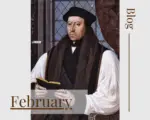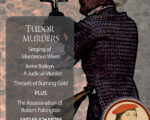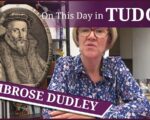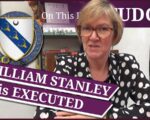
-
Blog: A Tudor Comeback, Thomas Cranmer and ‘Becoming Elizabeth’

-
28 February – Thomas Forret, a chief heretic and teacher of heresy and The fugitive wizard earl and an awful burning

On this day in Tudor history, 28th February 1540, Protestant Thomas Forret was burned at the stake in Castle Hill, Edinburgh, in the presence of King James V.
Forret was a former Augustinian monk and had spent his career teaching the common people and helping those in need. How did he come to this awful end in Edinburgh?
Find out all about Thomas Forret, and why he was accused of heresy, in this talk…
[Read More...] -
27 February – The ends of three Catholics at Tyburn and The Battle of Ancrum Moor and a legendary stone

On this day in Tudor history, 27th February 1601, Benedictine monk Mark Barkworth (also known by the alias Lambert), Jesuit Roger Filcock, and widow Anne Line were executed at Tyburn.
Barkworth and Filcock had been found guilty of treason for being priests and were given the full traitor’s death, i.e. they were hanged, drawn and quartered. Anne Line was sentenced to death for harbouring a priest and was hanged.
Find out more about these Catholics, who were victims of Queen Elizabeth I’s legislation against Jesuits, in this talk…
[Read More...] -
World Rulers in the Tudor Period

How much do you know about other rulers of the 15th and 16th centuries?
Test your knowledge of the other world leaders of the Tudor period in this week’s quiz – a crossword puzzle.
Simply click on the link or image below to open and print out.
[Read More...] -
26 February – The sad ends of loyal men and Christopher Marlowe, a rather colourful character

On this day in Tudor history, 26th February 1552, Sir Thomas Arundell, Sir Michael Stanhope, Sir Miles Partridge and Sir Ralph Fane (or Vane) were executed.
The men had been condemned as traitors after being accused of conspiring with Edward Seymour, Duke of Somerset and former Lord Protector, against John Dudley, Duke of Northumberland, the new man in control of King Edward VI’s government.
Find out all about these men and how these loyal royal servants came to these sticky ends in this talk…
[Read More...] -
March 2022 – Tudor Murders

Tudor Murders – what an interesting theme we have for you in this month’s magazine. Murder is always a gruesome but fascinating topic and this magazine doesn’t disappoint
[Read More...] -
25 February – Elizabeth I is excommunicated and The execution of Robert Devereux, Earl of Essex

On this day in Tudor history, 25th February 1570, Pope Pius V issued the papal bull “Regnans in Excelsis”. This bull not only excommunicated Queen Elizabeth I, it also freed her Catholic subjects from their allegiance to her and called on the English people to disobey her orders, mandates and laws. It threatened excommunication for those who did obey her.
It put Elizabeth I in danger and it put Catholics in an impossible situation.
Find out more about the bull and its impact in this talk…
[Read More...] -
Castles, Battles and Warfare with Julian Humphrys

Sadly, our resident battlefield historian, Julian Humphrys, hasn’t been able to do any videos for us recently, so in case you’re suffering withdrawal symptoms, I thought I’d share a few of his past videos from our archives…
[Read More...] -
24 February – Katherine Howard, Elizabeth I’s good friend and The Birth of Charles V, Holy Roman Emperor

On this day in Tudor history, 24th February 1603, Katherine Howard (née Carey), Countess of Nottingham, died at Arundel House.
Katherine was a close friend of Queen Elizabeth I and it is thought that grief over her friend’s death had a major impact on the queen’s own health, for she died just a month later.
Find out who Katherine was, how she rose to be the queen’s good friend, and also hear about a myth associated with her in this talk…
[Read More...] -
23 February – Job Throckmorton, a colourful and lucky character and What happened to Henry Grey’s head?

On this day in Tudor history, 23rd February 1601, religious pamphleteer and Member of Parliament, Job Throckmorton, was buried at Haseley in Warwickshire.
Job was known for his alleged involvement in the “Marprelate Controversy”, a pamphlet war, and also for his colourful Parliamentary speeches, which nearly got him into trouble. He was lucky to escape imprisonment and worse!
Find out more about Job Throckmorton in this talk…
[Read More...] -
22 February – Marie de Guise, who avoided marrying Henry VIII, and Catherine of Aragon and Henry VIII lose their baby boy

On this day in Tudor history, 22nd February 1540, twenty-four-year-old Marie de Guise, or Mary of Guise, queen consort of King James V of Scotland, was crowned queen at Holyrood Abbey.
Did you know that Henry VIII was keen on making Marie de Guise his fourth wife? She declined, saying that her neck was small! Instead, she married James V.
Marie was, of course, the mother of Mary, Queen of Scots, and you can find out more about her in this talk…
[Read More...] -
21 February – The death of Ambrose Dudley, Earl of Warwick and The Execution of St Robert Southwell

On this day in Tudor history, 21st February 1590, Ambrose Dudley, 3rd Earl of Warwick, Master of the Ordnance and Privy Councillor, died at Bedford House on the Strand.
Ambrose had been a loyal royal servant and was a member of that famous Tudor family, the Dudleys, with his father being John Dudley, Duke of Northumberland, and his brother being Robert Dudley, Earl of Leicester.
Find out more about Ambrose Dudley’s life and career in this talk…
[Read More...] -
20 February – The hanging of Lady Hungerford and King Edward VI’s Coronation

On this day in Tudor history, 20th February 1523, Agnes, or Alice, Lady Hungerford, was hanged at Tyburn.
Agnes was said to have “procured” her servants to murder her first husband, John Cotell, who was strangled before being thrown into the furnace of Castle Farley. A dastardly deed.
Find out exactly what happened in this talk…
[Read More...] -
Tudor Navy Crossword Puzzle

How much do you know about the English Navy during the Tudor period?
Test your Tudor naval knowledge with this fun crossword puzzle on Tudor ships, sea battles, developments and more.
[Read More...] -
19 February – The Rose Theatre, an Elizabethan playhouse and King Edward VI’s Coronation Procession

On this day in Tudor history, 19th February 1592, the Rose Theatre, an Elizabethan play house built by Philip Henslowe, was opened on Bankside in London.
Plays performed at the theatre included Shakespeare’s “Henry VI Part 1” and “Titus Andronicus”, Kyd’s “Spanish Tragedy”, and Marlowe’s “Doctor Faustus”, “The Jew of Malta” and “Tamburlaine the Great”. But, unfortunately, the Rose Theatre was abandoned by 1605.
Find out more about the Rose Theatre in this talk…
[Read More...] -
18 February – The Ridolfi Plot against Elizabeth I and the birthday of Queen Mary I

On this day in history, 18th February 1612, Italian banker Roberto di Ridolfi died in Florence, Italy, aged 80.
Amazingly, he died a natural death even though he’d been the brains behind the Ridolfi Plot, a plot to depose Queen Elizabeth I and to replace her with Mary, Queen of Scots, thereby restoring Catholicism in England.
Find out more about Ridolfi and his famous plot in this talk…
[Read More...] -
Tudor Cookery Books – Brigitte Webster

This week we have Brigitte talking about a little known subject – the history of cookery books in Tudor England.
[Read More...] -
17 February – Love at first sight for Mary, Queen of Scots? and Edward Seymour is made Duke of Somerset

Well, ok, perhaps love at second or third sight!
On this day in Tudor history, Saturday 17th February 1565, Mary, Queen of Scots, met and fell in love with Henry Stuart, Lord Darnley, at Wemyss Castle in Scotland. Just over 7 months later, the couple got married.
Find out more about the background of this meeting between Mary, Queen of Scots and Lord Darnley, Mary’s thoughts on Darnley, and what happened next, in this talk…
[Read More...] -
16 February – Sir William Stanley is executed and The burial of King Henry VIII at St George’s Chapel, Windsor Castle

On this day in Tudor history, 16th February 1495, Sir William Stanley, administrator and landowner, was executed for treason on Tower Hill.
Stanley is, of course, remembered for his key role at the Battle of Bosworth Field in August 1485, when he and his brother chose to support Henry Tudor and brought their troops onto the battlefield at a critical stage.
So how did Sir William Stanley go from being a loyal supporter of Henry VII to being executed for treason?
Find out in this talk…
[Read More...] -
15 February – Galileo, the Father of Modern Science and Dastardly deeds in Tudor England

On this day in Tudor history, 15th February 1564, the Italian physicist, mathematician, astronomer, and philosopher, Galileo Galilei, was born in Pisa, Italy.
Galileo was one of the central figures of the Scientific Revolution and has been referred to as “the Father of Modern Science”, “the Father of Modern Physics” and “the father of modern observational astronomy”, but what exactly did he do and how did he end up getting into trouble with the Inquisition?
Find out in this talk…
[Read More...] -
14 February – Being a royal favourite doesn’t save you and A dog licks up the king’s blood

On this day in Tudor history, 14th February 1539, Sir Nicholas Carew, a royal favourite for over 20 years, was tried for treason after being implicated in the Exeter Conspiracy. Spoilers – his trial didn’t go well.
But how did a man who’d been in royal favour for so long come to such a sticky end? Find out in this talk…
[Read More...] -
Actors in Tudor Movies and Series Word Search

There have been so many series and movies about the Tudors over the years, but can you remember which actors and actress played parts in them?
Test your knowledge of actors in Tudor-themed movies and series with this fun word search puzzle.
Warning: the words can go in any direction!
[Read More...] -
13 February – Bess of Hardwick and the Executions of Catherine Howard and Jane Boleyn, Lady Rochford

On this day in history, 13th February 1608, prominent Tudor noblewoman and one of the richest people in England, Elizabeth Talbot, Countess of Shrewsbury, more commonly known as Bess of Hardwick, died at her home at Hardwick.
Bess of Hardwick is known for her building projects, which included Chatsworth and Hardwick Hall, her beautiful needlework and the fact that she and Shrewsbury were guardians of the captive Mary, Queen of Scots.
Find out more about this fascinating Tudor lady in this talk…
[Read More...] -
12 February – Blanche Parry, a mother figure to Elizabeth I and the executions of Lady Jane Grey and Lord Guildford Dudley

On this day in Tudor history, 12th February 1590, Blanche Parry, died at the age of 82.
She had served Queen Elizabeth I loyally from Elizabeth’s birth in 1533,and had been a constant in the queen’s life.
Find out more about this interesting lady and how she served her queen in this talk…
[Read More...] -
11 February – Success for George Boleyn and the birth and death of Elizabeth of York

On this day in Tudor history, 11 February 1531, the ecclesiastical assembly known as convocation granted King Henry VIII the title of “singular protector, supreme lord, and even, so far as the law of Christ allows, supreme head of the English church and clergy”.
The person responsible for persuading convocation to grant the king this title was Anne Boleyn’s brother, George Boleyn, Lord Rochford. It was a big responsibility for the young diplomat and courtier.
Find out more about what happened in this talk…
[Read More...] -
The Private Lives of the Tudors by Tracy Borman – Lil’s Book Reviews

This week we have Lil talking about “The Private Lives of the Tudors” by Tracy Borman, which she calls a “biography of sorts”. Does she like the book?
[Read More...] -
10 February – Catherine Howard goes to the Tower and the Murder of Lord Darnley

On this day in Tudor history, 10th February 1542, Catherine Howard, King Henry VIII’s fifth wife, was escorted by barge from Syon House, where she’d been kept since November 1541, to the Tower of London in preparation for her execution.
Sadly, the queen would have seen the heads of her former lover, Francis Dereham, and her sweetheart, Thomas Culpeper, as she made her way to the Tower – a reminder of her own fate.
Find out more in this talk…
[Read More...] -
9 February – An awful end for a bishop and Jane Boleyn, Lady Rochford, is taken to the Tower

On this day in history, 9th February 1555, Protestant John Hooper, Bishop of Gloucester and Worcester, and former Cistercian monk, was burned at the stake for heresy in Gloucester.
It was an awful execution due to green wood being used, and John Foxe writes of there being three attempts over a period of 45 minutes. Awful, just awful.
Find our more in this talk…
[Read More...] -
8 February – The Queen’s favourite rebels and the Execution of Mary, Queen of Scots

On this day in Tudor history, 8th February 1601, Robert Devereux, 2nd Earl of Essex and Queen Elizabeth I’s former favourite, did a rather foolish thing and raised a rebellion against the queen and her council.
Spoilers: It didn’t go well and he ended up being executed as a traitor.
Find out exactly what happened in this talk…
[Read More...] -
7 February – The birth of Sir Thomas More, a joust, unrequited love and a nasty accident

On this day in history, 7th February 1477 or 1478, Sir Thomas More, Henry VIII’s Lord Chancellor, was born in London.
More had once wanted to be a monk but ended up being one of the most well-known statesmen of the Tudor period. Unfortunately, Sir Thomas More came to a sticky end after refusing to sign the oath recognising Henry VIII as the supreme head of the church in England, and was executed in 1535 as a traitor.
Find out all about More’s rise to power, how he fell, and what he told his son-in-law about the king, in this talk…
[Read More...]
